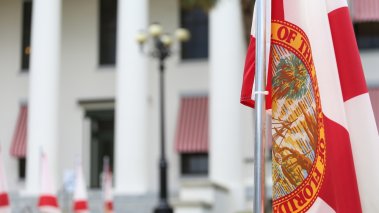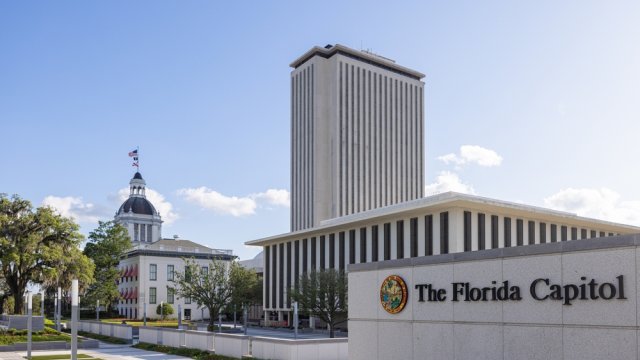Table of Contents
Florida just doubled down on the Stop WOKE Act, and the new bill is just as unconstitutional

K M H P H O T O V I D E O / Shutterstock.com
The Florida House of Representatives voted today to send Senate Bill 266, approved by the Florida Senate on Friday, to Governor Ron DeSantis’ desk.
The legislation doubles down on the Stop WOKE Act, which unconstitutionally bans ideas a majority of Florida lawmakers disfavor from college classrooms, despite the fact that FIRE, the NAACP Legal Defense and Educational Fund, and the American Civil Liberties Union secured a preliminary injunction from a federal court last November blocking Florida’s public universities from enforcing the law.
FIRE opposed SB 266 (as well as its counterpart, HB 999) on many grounds because it is riddled with constitutional defects. First and foremost, the legislation again intrudes on what can be taught in college classrooms by instructing the Board of Governors to review classes for violations of the Stop WOKE Act and for class content “based on theories that systemic racism, sexism, oppression, or privilege are inherent in the institutions of the United States and were created to maintain social, political, or economic inequities.”
This provision is flatly unconstitutional.

Thought the ‘Stop WOKE Act’ was bad? A new Florida bill is worse
News
Florida House Bill 999 is a dangerous expansion of the unconstitutional ‘Stop WOKE Act,’ putting entire majors disfavored by legislators on the chopping block.
As FIRE has explained many times in our defense of faculty across the political spectrum, the First Amendment and academic freedom protect the right of faculty members to discuss pedagogically relevant material and viewpoints in their courses. Simply put, no ideas are so repugnant that the government may ban students or professors from discussing them as they see fit in college classrooms.
Indeed, the Supreme Court has made clear that the First Amendment bars legislation that imposes a “pall of orthodoxy” over higher education. That principle spans six decades of Supreme Court precedent protecting academic freedom and free expression in higher education. These cases foreclose the argument that because the institutions are publicly funded and operated, the government can ban ideas it dislikes from college classrooms.
Another glaring problem with the bill’s hostility towards free expression and academic freedom is a section that prevents institutions from spending any resources to “promote, support, or maintain any programs or campus activities” that may be in violation of the Stop WOKE Act, or that “[a]dvocate for diversity, equity, and inclusion, or promote or engage in political or social activism, as defined by rules of the State Board of Education and regulations of the Board of Governors.”
This sweeping provision is so broad that it too intrudes into what can be taught in college classrooms and poses the additional problem of discriminating against disfavored views when it comes to expending any resources. It includes language that exempts student activity fees, but other funds would remain unavailable to students, student organizations, or faculty that want to hold programming or go to conferences where someone might speak in favor of a banned idea. Yet funds could still be provided to those who wish to hold programming or attend conferences where someone speaks in lockstep with the majority of Florida lawmakers’ preferred positions.
Prohibiting ideas in the name of freedom is not freedom at all. It is censorship.
In other words, if a student group wanted to hold an event supportive of “diversity, equity, and inclusion,” this law would prevent them from receiving any funds beyond those they receive from student activity fees. But if another group wanted to host a speaker to make a case against DEI, the institutions are free to provide them with additional funding. That’s textbook viewpoint discrimination.
Freedom of expression is important precisely because some ideas and viewpoints will not be held by the majority of all people. And our public colleges and universities are meant to be exactly the places where faculty and students can propose, advance, and dissect ideas — however popular or unpopular they may be. A legislature voting to take certain ideas off the table entirely is precisely the “pall of orthodoxy” the Supreme Court denounced.
Like the Stop WOKE Act, SB 266 cannot be squared with the First Amendment — or even Florida’s campus free speech law, which FIRE helped enact in 2018. That law prohibits institutions from shielding students from “ideas and opinions that they may find uncomfortable, unwelcome, disagreeable, or offensive.” But that kind of infantilizing shield is just what the Florida legislature has now sent to the governor’s desk.
Bans on ideas in the collegiate setting are unconstitutional, illiberal, and shortsighted. Prohibiting ideas in the name of freedom is not freedom at all. It is censorship.
Recent Articles
FIRE’s award-winning Newsdesk covers the free speech news you need to stay informed.

Texas tramples First Amendment rights with police crackdown of pro-Palestinian protests

Here’s what students need to know about protesting on campus right now

Kansas takes a stand for intellectual freedom


